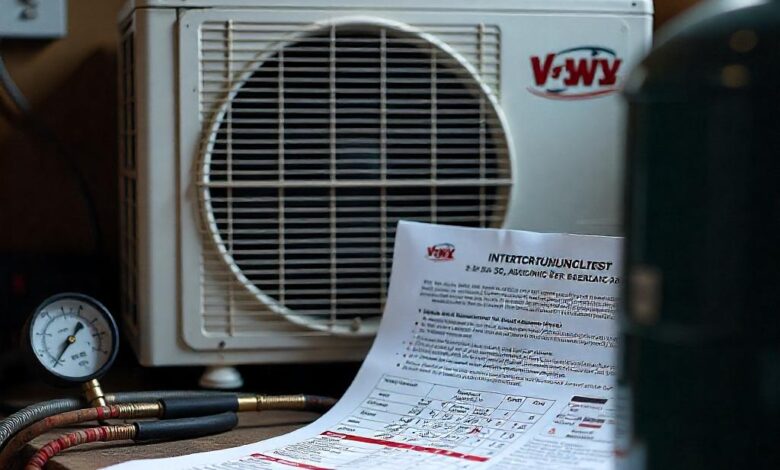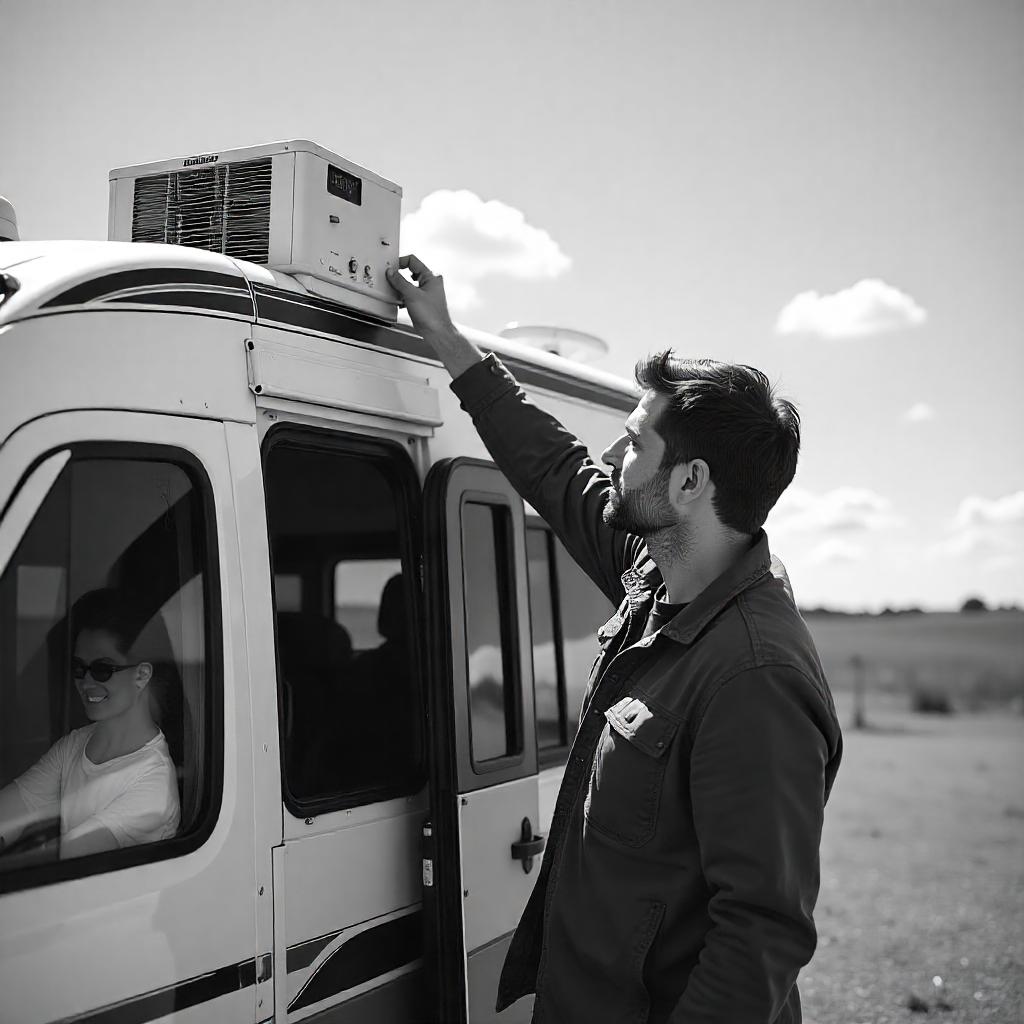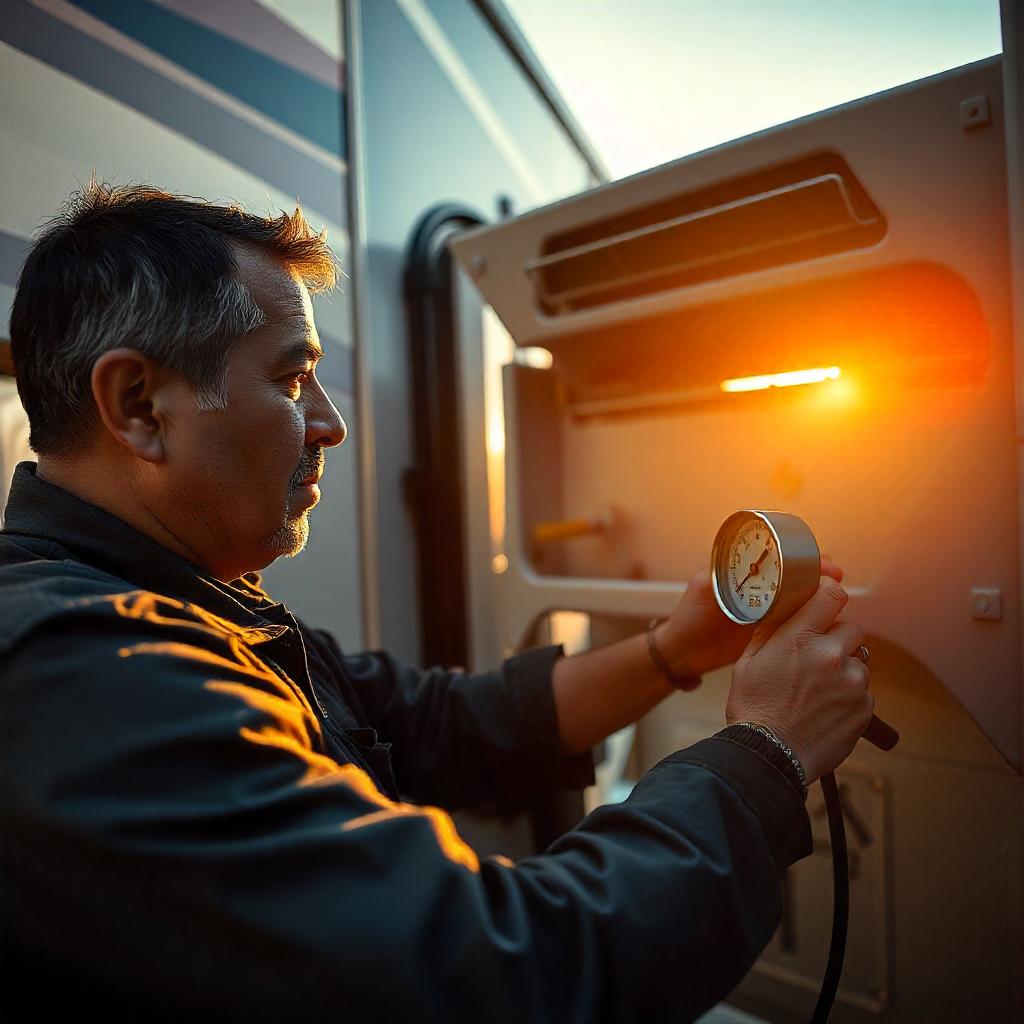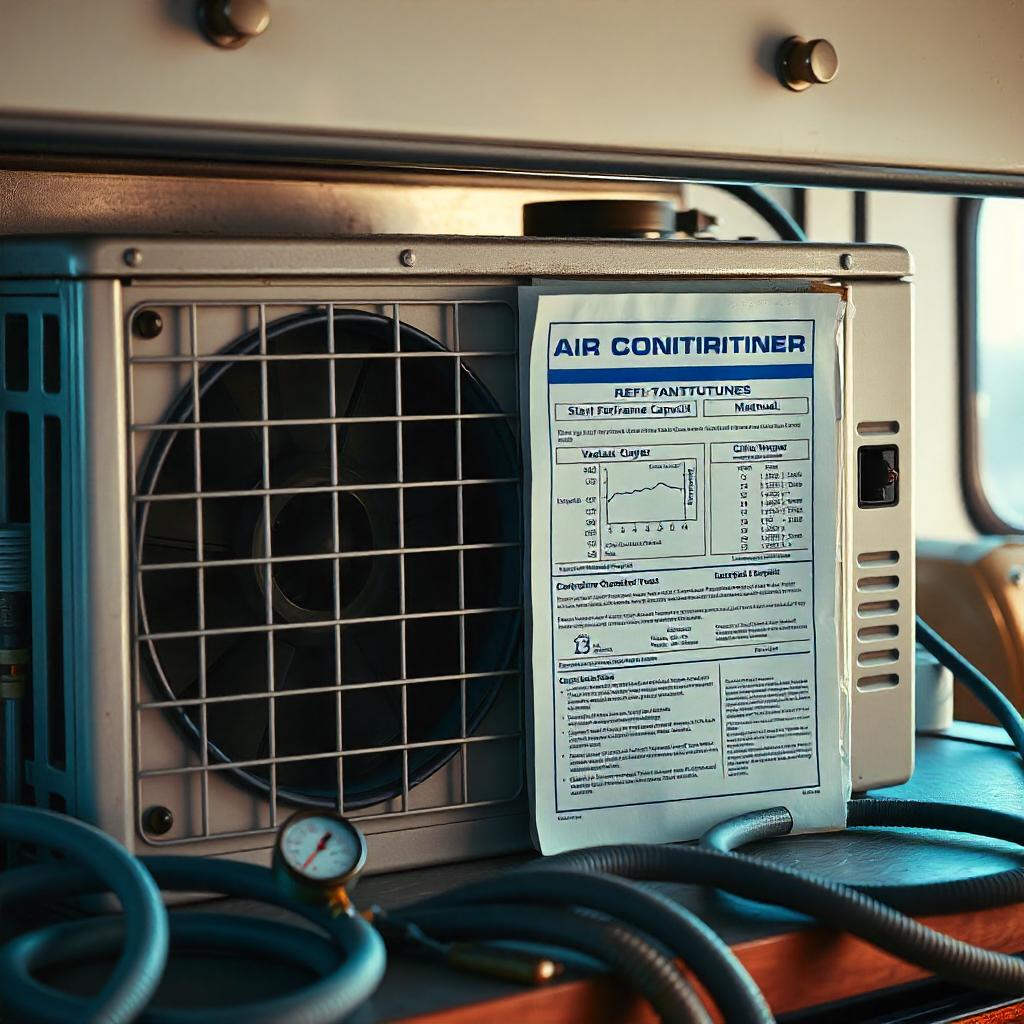How Much Refrigerant Does an RV Air Conditioner Need?

Table of Contents
Key Takeaways:
- RV air conditioners typically need 1-2 pounds of refrigerant.
- Always check the manual for the specific refrigerant type and capacity.
- Regular maintenance prevents leaks and costly repairs.
What is Refrigerant?
What role does refrigerant play in an RV air conditioner?
The air conditioning of an RV is referred to as refrigerant. It is just a chemical which is used in the process of moving heat from inside an RV to the outside. This one makes a cooling effect in the room for the air conditioner to do its work effectively. Am Generally under normal circumstances, refrigerant is in charge of the task of cooling the air surrounding your home hence for the AC to perform this it has to.
Types of refrigerants used in RV air conditioners
Some RV air conditioners may contain refrigerants R-410A or R-22 in this type of unit. The former is used newly developed units as a results of the environmental legislations while the later is banned due to its working capacity on the ozone layer.
| Type of Refrigerant | Common Usage | |
|---|---|---|
| R-410A | Newer RV AC models | Environmentally friendly |
| R-22 | Older RV AC models | Ozone-depleting, being phased out |
Why is refrigerant critical for cooling efficiency?
Your air conditioning system cannot effectively cool air or evaporate the refrigerant if there isn’t enough of it. This leads to low cooling efficiency, high electricity consumption and harm to the machine. A proper charge of the refrigerant promotes efficient working of the system as well as proper cooling of the RV.
How RV Air Conditioners Work?
How does refrigerant circulate in an RV air conditioner?
This means that refrigerant circulates in the AC system on a round the clock basis. It moves between two main parts: the evaporator – where it draws heat out from the inside of the RV – and the condenser – where the heat is deposited outside. This cycle continues to keep cool temperatures in the interior of the RV.
What components rely on refrigerant for operation?
Refrigerant flows through the condenser part of the AC, through the evaporator coils and then to the compressor. All these components enable the refrigerant to be changed from gas back to liquid form making the air conditioner work.
How does refrigerant affect cooling performance?
The quantity of the refrigerant you have in your system determines its cooling power. If there is little refrigerant, it will not cool, if it is too much, it leads to pressure problems and overheating, system failure.
How Much Refrigerant Does Your RV Air Conditioners Need?

What’s the typical refrigerant amount for RV air conditioners?
Average RV air conditioning units contain between 1 to 2 pounds of the refrigerant. The quantity of energy, however, depends on something known as the model size of the unit. Before doing this, always consult your AC’s manual to determine how much of this substance is needed.
How do you find the correct refrigerant capacity for your unit?
The correct refrigerant capacity can be checked in the owner’s manual or by the label placed inside the unit. Inability to do so will require the use of a manual or talking to the manufacturer or any technical expert.
What happens if you overfill or underfill refrigerant?
In such a case, an excess of pressure is created which, in turn, leads to the damaging of compressors. Underfilling, on the other hand, results in poorly efficiency of the cooling system as well as freezing of the evaporator coils.
Read Also : How to Add an RV Holding Tank at Home? : : Does Using an RV Green Key Break the Lock? :
Signs of Low Refrigerant in RV AC
How can you tell if your RV air conditioner is low on refrigerant?
Here are some common signs that your RV AC is low on refrigerant:
- Blowing warm air instead of cool air
- Increased energy consumption (higher utility bills)
- Ice buildup on the evaporator coils
- Hissing or bubbling sounds, indicating a leak
What are the effects of low refrigerant on cooling efficiency?
Too little refrigerant decreases the efficiency of your air conditioning system by compromising the ability of the AC to cool the refrigerant. The unit will work for a longer period of time and at the same time, it will be working harder to cool the air in the RV which can only mean that the energy used will be high and hence the nee
Can low refrigerant cause permanent damage to the system?
Yes, running AC with low refrigerant over an extended period will harm the compressor which is a costly part to fix. Failure to solve low refrigerant concerns can result in larger repair work in the future, therefore requires early adoption.
Measuring and Checking Refrigerant Levels
How do you measure the refrigerant level in an RV air conditioner?
To measure refrigerant levels, you’ll need specialized gauges designed to check pressure in the system. These gauges connect to the low-pressure port on the AC unit.
What tools are required for checking refrigerant levels?
Here are the basic tools you’ll need:
- Refrigerant manifold gauge set
- Thermometer for checking temperature differences
- Service valve wrench to access the ports
When should you check refrigerant levels in your RV AC?
It is recommended that the refrigerant levels be checked at least once each year, with small vehicles being used in frequent checks prior to the commencement of summer. You should check right away if you observe any of its symptoms such as low refrigerant.

Recharging Your RV AC
How do you add refrigerant to your RV air conditioner?
Recharging your AC means putting more refrigerant through the low-pressure service port. In most cases it is recommended not to overfill, so always refer to the manufacturer’s instructions.
What are the steps to safely recharge an RV AC?
- Turn off the AC unit.
- Connect the refrigerant gauge to the low-pressure port.
- Slowly add refrigerant while monitoring the gauge.
- Once the desired pressure is reached, stop adding refrigerant.
Can you recharge your RV AC yourself, or should you hire a professional?
While it’s possible to recharge the AC yourself, it’s recommended to hire a professional for safety and to ensure the correct refrigerant type and amount are used.
Preventing Refrigerant Leaks
What causes refrigerant leaks in RV air conditioners?
Refrigerant leaks are often caused by:
- Get attrition of hoses and seals
- Corrosion in the system
- Damaged of the coil or the pipes of the refrigerator or compressor
How can you prevent refrigerant leaks?
You can prevent leaks by:
- Daily conductance and checking of hoses and connections for signs of wear and tear
- It is also essential to have annual maintenance check.
- This is because if the system’s charge is overemphasized then the power will be difficult to regulate.
What should you do if you suspect a refrigerant leak?
If you feel that your AC is leaking, switch off the system and ask a technician to take a leakage test. Always avoid do-it-yourself whenever there is refrigerant leakage problem.
Maintenance Tips for Refrigerant Efficiency
How often should you service your RV air conditioner?
In most cases, the best time to service your AC is in the early spring before the heat sets in, because it’s easy to test all the functions and check such parameters as refrigerant charge, and cleanliness of the system.
How does regular maintenance impact refrigerant performance?
Low cost is mainly achieved by making sure there are no leaks, cleaning components and making sure there is the right amount of airflow. This enhances the effectiveness of the refrigerant and therefore the general performance of the unit burdened with the cooling duties.
What are the best practices for long-term refrigerant care?
- Minimize on dust accumulation by cleaning the AC; dust off from the coils
- The SBP2 requires the periodic monitoring of the refrigerant in the air conditioning system annually.
- Leakes should be acted on at once in order not to cause harm.
Cost of Recharging an RV AC
How much does it cost to recharge an RV air conditioner?
If you need to recharge an RV AC, you will have to pay anything between $100 and $200 depending on the type of refrigerant that you will be recharged and the charges that the RV mechanic will charge you.
How does refrigerant type impact the cost of recharging?
Older refrigerations which include R-22 are still costly since they are being stricken from the market leaving new refrigerations such as R-410A cheaper.
Are there cost-effective ways to maintain refrigerant levels?
Preserving air ways is another way of saving money, for instance, through maintenance to avoid recharge or repair costs.
Choosing the Right Professional for RV AC Refrigerant Service
How do you find a qualified technician for refrigerant services?
Pay attention to persons who are qualified EPA Section 608 that gives certification to the technician in the restoration of the refrigerants.
What questions should you ask before hiring a professional?
- Do you have experience working with RV air conditioners?
- Are you certified to handle refrigerants?
- What’s your process for detecting and fixing leaks?
How can you ensure the service is done correctly?
Whether you’re working with a residential technician or commercial HVAC specialist, there are several things you can do to ensure you receive quality service: Look for customer feedback, don’t hesitate to ask the technician about the warranty for the work being done and when the technician will be handling refrigerants, see if he or she follows all necessary safety precautions.

Understanding Environmental Concerns
How does refrigerant impact the environment?
Hazards from some of the refrigerants include: R-22 that has been noted to thicken the ozone layer and also possesses a high GWP.
What are the regulations around refrigerant disposal?
Refrigerants in the distribution system have to be disposed appropriately, as concluded by the EPA regulations including rightful recovery and recycling. Refrigerants should never be sent to the atmosphere.
How can you choose an eco-friendly refrigerant option?
The new refrigerants such as R-410A should be used because they are cheaper and less hazardous to the environment. Also, from the aspect of environmental protection, the re-charging frequency contributes to lowering of refrigerant leaks.
Conclusion
All in all, the number of pounds of refrigerant that an RV air conditioner requires is between 1 and 2, though this depends on a model. Requiring proper horn refrigetre levels to ensure that your AC is in a proper functioning state and prevent some severe damages. If service providers fail to check for low refrigerant and you begin to notice warm air, or high energy consumption then you are in trouble.
Features such as making sure the refrigerant levels are okay and that there are not any leaks present will go a long way towards keeping your RV AC functioning as it should during your journey. It is very important to contact an expert if you are in doubt regarding the volume of refrigerant needed or how to recharge that of an AC. Maintenance of your refrigerant system not only ensures your ac is in its best performance state but also environmentally friendly.




